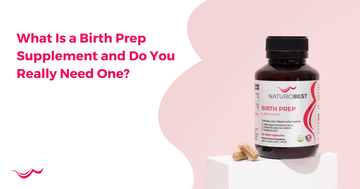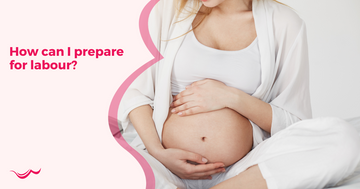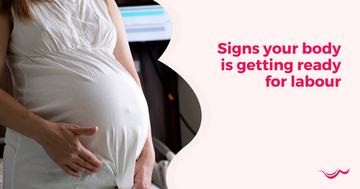How to Cope with Labour Pain Naturally
by Nikki Warren on May 13, 2022

One of the most exciting events when having a baby is the day your bub is born. You may also have some anxiety about how you might cope in labour. Some women plan an elective caesarean, and some women feel cheated unless they get their drug-free, vaginal birth.
If you are one of the latter, I totally get it – I was one of those women myself. During my first pregnancy I naively thought I didn’t really need to prepare for labour. "How hard could it be? Women gave birth every day", I thought.
I had planned on a water birth at a birth centre. You can imagine my rude awakening when I ended up having a 39-hour labour and an epidural in a hospital!
Second time around I was fully prepared and ended up having a 6-hour, drug-free labour. Here are some of my top tips to cope with labour pain naturally.
Sterile Water Injections
Ask your midwife about sterile water injections during labour for back pain. Sterile water is injected into the lumbo-sacral region of your back. It can provide relief from pain for up to 90 minutes.
Not every woman experiences back pain in labour. For some, they only experience pain in the abdomen or pain in the back. For some unlucky women (like me), they experience pain in the abdomen as well as the lower back.
I was fortunate enough to have sterile water injections during my labour and was pleasantly surprised that my back pain completely disappeared! Only having to deal with pain in my abdomen made the contractions a lot more bearable.
Massage
Massage can offer great relief, especially if you experience back pain. Have your birthing partner use some aromatherapy massage oil and starting at the sacrum, press hard across the lower back towards your hips. Another technique your partner can use is counter-pressure by squeezing your lower hips or applying pressure to your sacrum.
During early labour, massage can help you to relax and relieve anxiety, which in turn reduces pain. This is a great concept to keep in mind - Fear = tension = pain.
Herbal Medicine
Traditionally, red raspberry leaf tea is consumed during labour. However, this herb is often taken during the third trimester to prepare the body for labour.
A study published in 1999 involving 108 women found that raspberry leaf shortened labour. An unexpected finding was that the women were less likely to require artificial rupture of their membranes, caesarean section, forceps or vacuum birth (ventouse).
The majority of these women started taking raspberry leaf between 30 to 34 weeks gestation. In 2001, a follow up trial by the same authors of 192 women, found that when they took 1.2 grams of raspberry leaf twice daily from 32 weeks of pregnancy to labour, it reduced the second stage of labour (the pushing stage) by an average of 9.6 minutes! There was also a lower rate of forceps deliveries.
Squaw vine is another herb traditionally used in the third trimester to prepare for labour. In combination with red raspberry, it can assist with recovery postpartum due to its uterine tonic and astringent qualities. An astringent is a substance that causes constriction of mucus membranes and exposed tissues, reducing blood flow.
If you wish to take herbal medicine for pain during labour, you need to have a consultation with a medical herbalist about the best herbal blend for you. It is essential though, to avoid blue cohosh which some women take in an attempt to bring on labour. This has been associated with a myocardial infarction in an infant.
Aromatherapy
You can inhale aromatherapy oils, add some to your bath as well as adding some to your massage oil.
Aromatherapy can relax your mind, help induce sleep during early labour as well as help to reduce pain. Popular oils for labour include Clary sage, Jasmine, Rose and Lavender.
Homeopathy
Many women swear by homeopathic remedies during labour. I learned about the following remedies from an experienced homeopath who assisted women during their labour.
Arnica 10M should be taken as soon as labour starts (the first intense contraction, not period pain/Braxton Hicks type contractions). This is reported to help prevent bruising and swelling. Ensure a speedy recovery and help to make labour faster and less painful as it helps muscle contraction. You can also use Arnica after labour if you are in shock – tell your birth partner to watch for signs of chilliness and shaking.
Caullophylum 10M gives the uterus a boost and can help dilate a rigid cervix thus making labour more efficient.
Homeopathic remedies are also fantastic for helping you to recover post-birth. Take Arnica 1M 1 dose 3 times over a 24-hour period (1 dose every 8 hours) followed 24 hours later by Bellis Perenius 1M 1 dose 3 times over a 24-hour period. Arnica helps to speed recovery and Bellis Perenius has an affinity for the uterus.
Breathing
Learning some breathing techniques prior to labour helps you to stay focused during contractions. Try breathing in for 4 and out for 6.
Hypnobirthing/Calmbirth
Attending Hypnobirthing or Calmbirth antenatal classes can really help prepare you for the big day. You will learn how to breathe through contractions (or surges) and techniques to stay calm and reduce anxiety.
Heat
Heat two wheat bags and apply one to your stomach and have your partner apply one to your back if you have back pain.
Another way of applying heat is to have a cloth nappy and a bucket of hot water - when a contraction comes on, your partner can wring out the nappy and apply it to your back.
Music
Put together a Spotify list of your favourite songs. Easy listening music can help you to relax and soothe your nervous system.
Keep Lights Low
Get in the zone by keeping curtains drawn and lights low. If you’re having a homebirth, you could try setting up a relaxing atmosphere with candlelight and aromatherapy.
Another tip for having a homebirth is to find a midwife who has prescribing rights. This will allow her to bring gas and air if required. Although sucking on gas and air doesn't reduce pain, it can help to soothe your mind and may be the difference between a successful homebirth or a trip to the hospital for an epidural.
Water Immersion
A hot shower is great for early labour but when you are in active labour, immersing yourself in a bath or hot tub is a great way to relieve pressure and pain. Make sure you are guided by your midwife as hopping in the tub too early can slow down your labour.
Positive Affirmations
Ask your birthing partner to read these out so you can repeat after them (even if it's just in your head). These will fool your subconscious into believing it and help you to relax which in turn relieves pain.
I am calm and relaxed
With each contraction, my cervix is dilating more and more, and baby is descending
My breathing is slow and even
My legs and hands are relaxed; my face, shoulders, stomach and abdomen are relaxed
My pelvis is relaxed, my cervix is relaxed
Soon my baby will be here
If your birth doesn't go to plan, it's important to talk to someone about it. Preferably someone who although may be well intentioned, doesn't say something stupid like "oh well, all that matters is that you and the baby are healthy". No, that's not all that matters. What matters is that you are able to process it over time, come to terms with what happened and prepare yourself fully for next time.
All the best mama, for one of the most memorable experiences of your life! x




